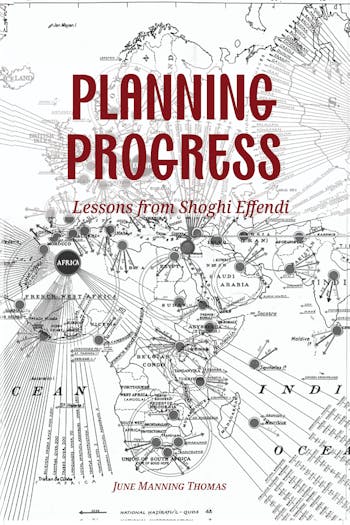Planning Progress: Lessons from Shoghi Effendi
2nd edition with foreword by Todd Smith
This is a practical examination of the idea that planning as a skill is essential to human progress, but that some individual exemplify this skill more than others, and furthermore that such individuals may be able to help organizations move in a more purposeful direction. The book reviews planning theory in relation to planning for a better future, looking at classic authors in the field and then explores the planning style of one key leader, Shoghi Effendi, to show how such strategies as vision, encouragement, and feedback can help improve the planning outcomes for a range of human organizations. Other major components of able planning include consultation, goal-directed behavior, and meaningful action.
The original letters of Shoghi Effendi, dating largely from 1936 to 1957, offer illustrative text for these principles. In this particular case, his leadership of a worldwide spiritual community devoted to the principles of unity and justice and yet stymied by low growth rates drew successfully on such principles in order to achieve progress in a series of countries and continents. The book includes practical suggestions for improving the planning success of organizations private and public as well as of individuals.
Author
June Manning Thomas
June Manning Thomas, PhD, has studied and written several articles and books about race unity and anti-Black racism, such as Redevelopment and Race: Planning a Finer City in Postwar Detroit; co-edited The City after Abandonment; and the recent Struggling to Learn: An Intimate History of School Desegregation in South Carolina. She is Professor Emerita of Urban and Regional Planning at the University of Michigan and a faculty member of the Wilmette Institute.

Review
Professor Thomas' scholarship combines the benefits of her academic training with her long-time Bahá'í experience and love of the administrative order, to bring to her study a remarkably poignant, humble, and insightful approach. Beyond drawing upon her research of related books, articles, and materials, she systematically applies a content analysis to Shoghi Effendi's Plan-related letters, postscripts and cables. Her analysis presents the key ideas, themes, and particular characteristics that helped to make the Guardian's planning effective. For example, the author outlines the ways in which the Guardian conveyed vision, identified goals and lines-of-action, and monitored, encouraged, and evaluated the progress of the Bahá'ís throughout the Plans. Professor Thomas also shows how Shoghi Effendi exemplified good leadership through his ability to consult with and empower others. His fact-finding, through extensive consultations with thousands of Bahá'ís world-wide, provided specific strategies and attainable objectives for each national community. His wise assessment of the capacity and potential of his followers, his counsel, liberal praise and encouragement, gave the inspiration and support needed to assist the Bahá'ís to achieve these objectives. . . .
Professor Thomas' book provides a reference and a resource for individuals and institutions that seek to engage in integrating spiritual principle with scientifically-based action. In the final analysis, this book will invoke a deeper appreciation for Shoghi Effendi's extraordinary career as a spiritual leader. It is a joyful testimony to the Guardian's brilliance as a master planner.Lynn Echevarria -- Journal of Bahá'í Studies, 2000
